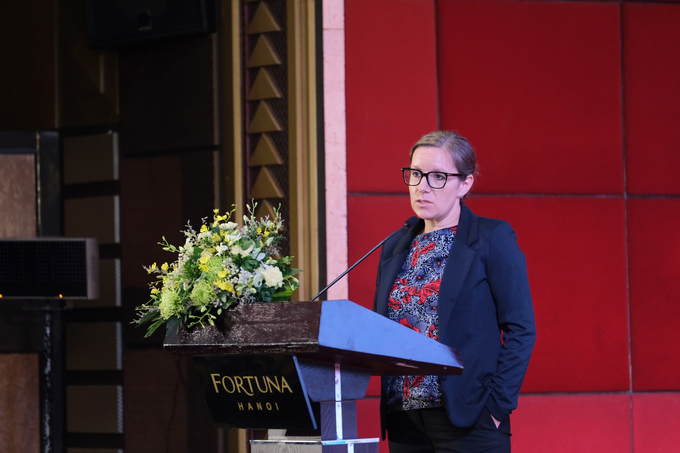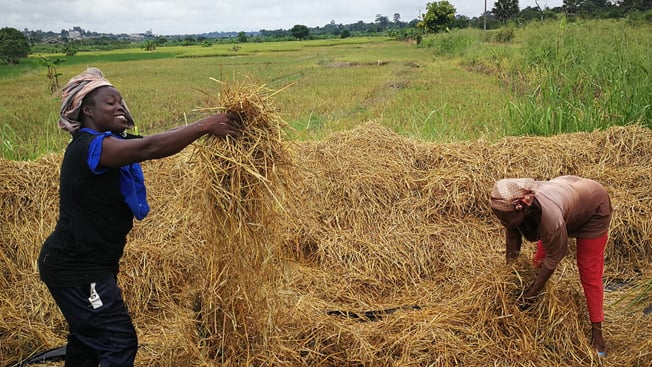May 30, 2025 | 02:55 GMT +7
May 30, 2025 | 02:55 GMT +7
Hotline: 0913.378.918
May 30, 2025 | 02:55 GMT +7
Hotline: 0913.378.918

Ms. Sonja Esche, the Agricultural Team Leader of the German Corporation for International Cooperation (GIZ) speaking at the conference. Photo: Quynh Chi.
Ms. Sonja Esche, the Agricultural Team Leader of the German International Cooperation (GIZ), highlighted the close collaboration with MARD in the area of agriculture and food sector transformation by implementing the Green Innovation Center (GIC) Project, an initiative by the German Government. It is a global program, concentrating on the innovative and sustainable transformations of the Agriculture and Food Sector across 16 countries (14 on the African Continent and 2 from Asia) and 21 value chains.
The GIC project in Vietnam focuses on the broad-scale adoption of innovations among small-scale farmers and up- and downstream enterprises in the rice and mango value chain through innovative agricultural technologies, and sustainable farming practices. The aim is to not only boost income and employment, but also to reduce environmental pressures, reduce greenhouse gas emissions, and so to foster more sustainable value chains. With that, the project is supporting MARD in its strategy to transition to a climate resilient, high quality and low emission rice sector and support Viet Nam in achieving its Net Zero 2050 target.
As part of this, GIZ also had the opportunity to support MARD in their efforts on the topic of South South Cooperation. Being a global programme, exchange between the 16 countries involved came naturally and it started quite small with technical exchanges between practitioners on the differences of the rice value chain in the different countries. Over time, more colleagues got interested and wanted to be involved and the topic of South South Cooperation and it became more prominently in the project implementation.
So far, a true highlight was the South-South exchange visit of the Global Green Innovation Center's rice working group in May 2023 with over 30 representatives from 5 different African countries coming to the Mekong Delta. This exchange, organized with support from MARD and DARDs allowed for practical and hands on sharing of knowledge and experience on the factors contributing to the success of Viet Nam's rice sector. The collaboration, networks and friendships that have evolved out of this, are remarkable.
GIZ highlightes the importance of dialogues such as this conference today between the different partners to share, discuss and learn from each other. As a mutual understanding and equal partnership is important for a successful South-South Cooperation and so food security and sustainable development.
" This workshop presents an great opportunity for Vietnam and several different African countries to share experiences and discuss the potential for a future collaboration", Ms. Esche emphasized.

Vietnam is a trustful and active partner in the global efforts to eradicate famine, reduce poverty, and develop rural agriculture. Additionally, it is a significant contributor to the provision of agricultural technology in Africa. Photo: UN.
The advantages of South-South cooperation aren't limited to the increase in rice productivity; they also extend to the enhancement of farmers' resilience to climate change and their quality of life. Nevertheless, in order to be truly effective, it is imperative to enhance funding, develop the capacity of organizations and individuals to engage in research and development, and effectively coordinate among stakeholders. Additionally, it is imperative to prioritize the promotion of South-South commerce and the utilization of digital technology in order to elevate the prestige and potential of collaboration.
Above all, South-South cooperation not only benefits the participating countries but also significantly contributes to the millennial objectives of reducing the flow of illegal migration, ensuring global agricultural security, and promoting political stability. Consequently, Vietnam is a trustful and active partner in the global efforts to eradicate famine, reduce poverty, and develop rural agriculture. Additionally, it is a significant contributor to the provision of agricultural technology in Africa.
Translated by Linh Linh

(VAN) Ms. Nguyen Thi Dung, Deputy Director of Ngoc Hoang Cooperative, shared about the journey of bringing dragon fruit to Europe, achieving annual revenues in the billions of VND.

(VAN) Bamboo products from Thang Tho Bamboo Cooperative have reached many countries around the world, while also creating jobs for local workers.

(VAN) The Management Board of Con Dao National Park reported that a green sea turtle, tagged in the Philippines, has traveled thousands of kilometers to lay 84 eggs on Bay Canh Islet.

(VAN) Green technology is paving a new path for sustainable aquaculture in the Mekong Delta in particular and across the country in general, helping reduce emissions and adapt to climate change.

(VAN) On May 27, La French Tech Vietnam (the French startup and innovation community in Vietnam) held the French Tech Summit Vietnam 2025.
/2025/05/27/4731-2-223159_980.jpg)
(VAN) No votive paper, no styrofoam, no plastic bags, no plastic bottles, and no single-use plastic trays are the key rules tourists should keep in mind when visiting Con Dao.

(VAN) In the fight against plastic pollution, Vietnam has been demonstrating a proactive, pioneering, and active role in addressing the greatest environmental challenge today.